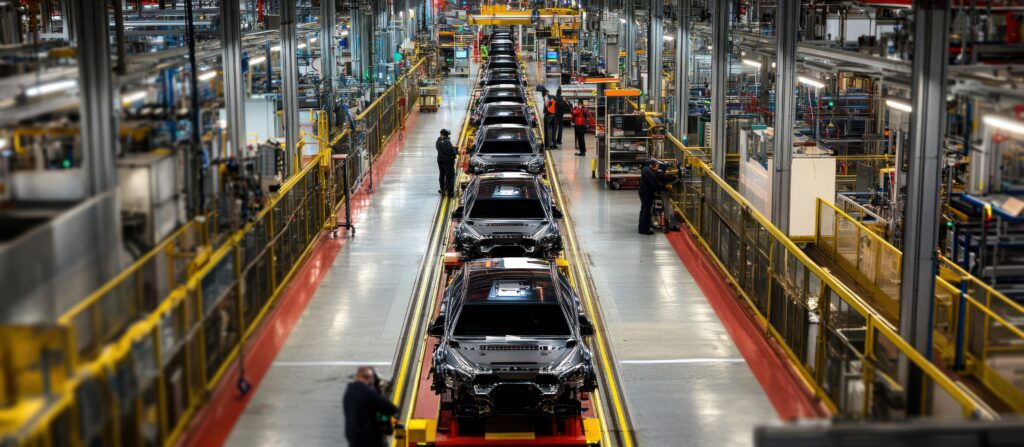As of 2025, Mexico’s automotive industry is not only surviving – it’s evolving. With a record production of 3.9 million light vehicles and exports exceeding 3.4 million units in 2024, Mexico is proving its strength on the global stage. Yet behind the impressive figures lies a complex landscape marked by international trade tensions, regulatory shifts, labor demands, and the urgent need for modernization.
With the upcoming 2026 review of the United States-Mexico-Canada Agreement (USMCA), Mexico faces pivotal questions: Can it maintain its competitive edge? Is it ready to meet stricter rules of origin? Will its infrastructure and workforce align with future demands, particularly in electric vehicles (EVs)?
This blog dives deep into the challenges and opportunities facing Mexico’s automotive industry and explores how Arriving Mexico’s network of strategic partners is delivering solutions for long-term success.
The Current State of Mexico’s Automotive Sector
In 2024, Mexico reached a historic production milestone in the automotive sector. According to industry data, 3.9 million light vehicles were manufactured, and more than 3.4 million were exported – primarily to the United States, Canada, and Germany.
Yet 2025 began with some uncertainty:
- Exports fell by 13.7% in January, compared to the same period in 2024.
- Production grew only modestly by 1.7%.
- Shipments to the U.S. dropped by 10.8%, highlighting vulnerability to market fluctuations.
The industry accounts for 4% of Mexico’s GDP and over 20% of its manufacturing output, making it essential not only to trade but to national economic stability.
The “Plan Mexico” Strategy and Government Incentives
To mitigate risks and boost competitiveness, the Mexican government launched “Plan Mexico” – a sweeping policy designed to attract foreign investment, promote domestic innovation, and drive economic development across key sectors, including automotive.
Key Objectives of Plan Mexico:
- Increase GDP investment to over 25% by 2026, and 28% by 2030.
- Boost local content in global value chains by 15% (especially in auto, aerospace, semiconductor, and pharmaceutical sectors).
- Incentivize innovation and dual-training programs in advanced manufacturing.
Fiscal Benefits:
- Immediate tax deductions of 56% to 89% for new investments in fixed assets.
- Additional deductions for training and innovation expenditures.
- Enhanced support for high-tech and EV-related investments.
The government has also outlined plans to regulate EV charging infrastructure and streamline customs procedures through a reengineered IMMEX 4.0 program.
The Coming Storm – USMCA’s 2026 Review
Mexico’s most significant trade agreement – USMCA – is due for a full review in July 2026. U.S. political shifts and industrial protectionism could push toward:
- Stricter rules of origin (requiring more regional content).
- Tougher labor standards.
- Higher tariffs on non-compliant imports.
- Potential auto part bans from «non-market» countries (e.g., China).
Any shift could deeply affect Mexican auto exports, especially to the U.S., which remains the primary destination (83.6% of exports in 2024).
Structural Challenges & Economic Pressures
Even with government backing, Mexico’s auto sector faces serious structural issues:
- Infrastructure Gaps: Many industrial zones lack adequate logistics, electricity, and water services.
- Skilled Labor Shortages: The rapid tech shift (towards EVs and automation) demands new talent profiles.
- Supply Chain Disruptions: Over-reliance on foreign suppliers for sensors, chips, and EV batteries increases vulnerability.
To remain a top-tier automotive hub, Mexico must tackle these challenges swiftly.
Integrated Solutions from Arriving Mexico’s Strategic Partners
To overcome these hurdles and unlock long-term competitiveness, businesses must align with the right expertise, tools, and partners. This is where Arriving Mexico’s network delivers unmatched value.
🏭 Fundidora Morelia – Foundry and Manufacturing Precision
Located in Michoacán, Fundidora Morelia provides high-quality steel castings essential for the production of engine parts, brake systems, and heavy-duty components.
- Ideal for Tier 1 and Tier 2 suppliers needing durable components.
- Engineering support, molding, and machining included.
🔗 https://arrivingmexico.mx/fundidora-morelia/
💼 GLZ Abogados – Legal Framework and Corporate Structuring
GLZ Abogados helps automotive companies navigate Mexico’s legal environment, offering:
- Labor and employment law advisory.
- Immigration and foreign investment counsel.
- Corporate structuring and compliance under Mexican and international law.
- Crucial support for IMMEX, VAT certifications, and customs law.
🔗 https://arrivingmexico.mx/glz-abogados/
📊 HLB MAAT Advisory – Financial Intelligence and Tax Strategy
As part of HLB International, MAAT Advisory supports auto firms with:
- Tax planning aligned with Plan Mexico incentives.
- Business strategy, audit, and forecasting.
- Transfer pricing and fiscal compliance for USMCA traceability.
🔗 https://arrivingmexico.mx/hlb-maat-advisory/
🔐 Lockton Mexico – Insurance and Risk Management
Lockton, the world’s largest independent insurance broker, tailors risk coverage for:
- Property, liability, and environmental exposures in auto plants.
- Health benefits and pension plans for manufacturing staff.
- Strategic actuarial consulting for long-term sustainability.
🔗 https://arrivingmexico.mx/lockton-mexico/
💡 OASA – Digital Integration for Trade & Tax Compliance
OASA is a specialist in fiscal technology and compliance automation:
- Electronic invoicing (CFDI), customs compliance.
- ERP integration for real-time traceability.
- IMMEX reporting and e-accounting compliance.
🔗 https://arrivingmexico.mx/oasa/
📉 ERA Group – Strategic Cost Optimization
ERA Group applies global benchmarking to help OEMs and suppliers:
- Cut operational costs (energy, logistics, procurement).
- Increase supply chain efficiency without sacrificing quality.
- Reduce waste, improve vendor management, and unlock hidden savings.
🔗 https://arrivingmexico.mx/era-group/
FAQs – Quick Answers for Industry Leaders
What’s the impact of the 2026 USMCA review on automakers?
It may lead to stricter rules of origin and additional labor and compliance requirements. Being prepared means optimizing cost structures, legal frameworks, and compliance now.
How can Arriving Mexico help my auto plant or supplier network?
Through a turnkey ecosystem: legal, tax, insurance, digital compliance, casting manufacturing, and cost management – all in one.
Is the Plan Mexico program relevant for international investors?
Absolutely. It’s designed to attract and reward foreign companies that commit to innovation, training, and local content development.
Conclusion
Mexico’s Road to 2030 Is Paved with Strategy
Mexico’s automotive future hinges on its ability to adapt. New policies, new technologies, and new trade dynamics demand a modern, resilient, and integrated response.
Through the coordinated services of Arriving Mexico’s network, companies can move beyond survival into strategic expansion. Whether optimizing supply chains, complying with evolving regulations, or building the EV infrastructure of tomorrow, the tools for success are already here.

